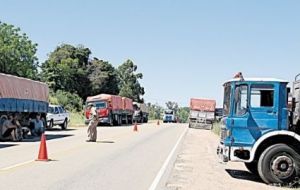MercoPress. South Atlantic News Agency
Argentine Exports Call For Government Help to Resolve Strike

Grains exporters called on the Argentine government on Thursday to help end a pay strike before it disrupts shipments from one of the world's biggest food suppliers.
Soy-crushing plants in and around the central city of Rosario account for about 80 percent of soybean oil and meal output from the top global exporter, but activity is slow at this time of year because the harvest has yet to begin.
Striking workers in port terminals to the north of the city downed tools and blocked access routes on Wednesday, virtually paralyzing export facilities and crushing plants operated by Cargill, Bunge, Molinos Rio de la Plata, Vicentin and ACA.
CIARA-CEC, the industry group representing exporters, has asked the government to intervene in the strike by the local branch of the CGT umbrella group. The CGT is headed by powerful government ally Hugo Moyano.
“We've asked for the Labour Ministry to intervene. We're presenting a request,” Alberto Rodriguez, CIARA-CEC's executive director, told reporters. He said he expected a response from the government on Thursday.
If the government decides to order a period of compulsory conciliation, strikers must go back to work while union leaders and bosses negotiate.
Grains markets are watching the strike closely, but traders say it is unlikely to have any additional impact on current high prices.
“We're getting used to these ups and downs, and I think there's also a sense that this isn't going to last too long and that they'll be some kind of deal,” said Fernando Botta, an analyst at Rosario-based grains brokerage Agrobrokers.
He said the strike would have a far greater impact in March, at the height of corn and soy harvesting.
The protesting workers, who include security and catering staff, are demanding the same 5,000-peso (U$1,208) minimum monthly wage secured by soy-crushing workers, who staged a two-day strike last month.
Crushing workers are not on strike but most have not been going to work because of the picket-lines outside plants.
Rodriguez said on Thursday the situation in the Rosario-area ports of Puerto San Martin and San Lorenzo “remains the same.”
Strikes, common in the run-up to pay talks that normally take place in February or March, are often resolved quickly before causing significant disruption to export activity.
Surging annual inflation of about 25 percent is fueling demands this year, although President Cristina Fernandez's government has called for moderation in pay talks. She will be keen to avert messy strikes before an October presidential election. (Reuters)




Top Comments
Disclaimer & comment rules-

-

-

Read all commentsShe's alway saying that problems are just a sensation, what's up?
Jan 27th, 2011 - 07:38 pm 0export tax is good for the economy, this striking farmers are digging their own graves, I think an agrarian reform will go a long way to fix this issues, and if this firms have anything to do with the strike, I think Argentina should use the oportunity to expropiate their land under a national security banner and give it to the struggling farmers who want to work.
Jan 27th, 2011 - 08:17 pm 0I think Cristina should stop hiding and acting like a Queen, she must do something now. She should stop blaming other people, she's the president (I'm not kidding guys, she really is the president of Argentina) Where is she now? In El Calafate? Who's in charge? El dolobu de Cobos? El soquete? El radical que era radical, pero kirchnerista, radical, no radical, no kirchnerista? Who's in charge in this country?
Jan 27th, 2011 - 08:43 pm 0Commenting for this story is now closed.
If you have a Facebook account, become a fan and comment on our Facebook Page!